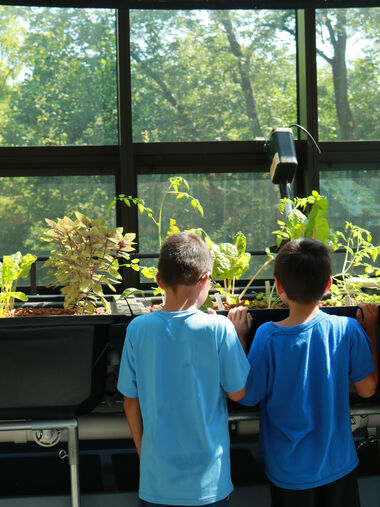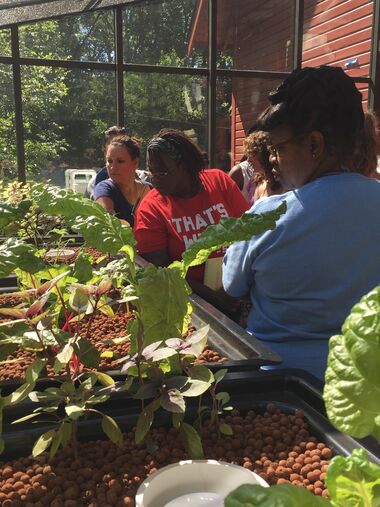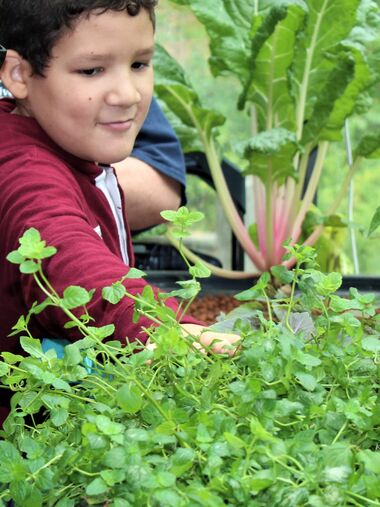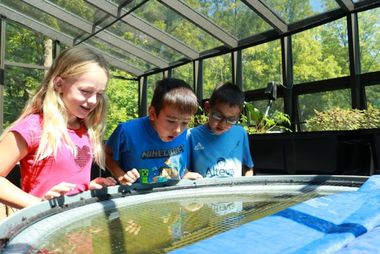
- Home
-
What We Do
- Programs
- Aquaponics
Aquaponics at Riverbend
Built in 2015, our state-of-the-art 300 square foot aquaponics greenhouse is a living learning laboratory that advances Riverbend’s mission of environmental literacy. Riverbend is a proud recipient of the 2017 Governor's Award for Environmental Excellence for the Building STEM Skills through Aquaponics Program!
Winter Aquaponics Field Trips
Winter at Riverbend has a lot to see! Join us for a special indoor and outdoor field trip to explore science skills using our Aquaponics Greenhouse. Our winter programs cover concepts ranging from animal and plant habitats to farming and earth cycles. Learn more about what these programs entail and how you will continue student's learning back in the classroom. These on-site field trips are for up to 50 participants.

Plants, Pollinators and Aquaponics!
Plants need sun and water to grow, but many also need pollinators to help them reproduce! In this hands-on program students will learn how plants grow and the important role of pollinators in transporting pollen from flower to flower so that fruit can grow and spread seeds. Students will explore the many phases of plant growth in Riverbend’s Aquaponics greenhouse and learn all about this environmentally friendly farming method (which uses fish waste as a nutrient source for plants). Students will also plant seeds that they will take back to school with them to be planted in a pollinator garden in the spring!
Topics Covered:
- Plant Growth
- Plant Life Cycle
- Aquaponics
- Gardening
Grades: K-2
The Future of Farming
Where does your food come from? If you answered the supermarket, this program is for you! There was a time when humans lived off the natural resources available to them. They settled near waterways, foraged for plants and hunted animals. Then came agriculture. Agriculture allowed humans to develop permanent settlements with reliable food sources. This program looks at the history and current state of agriculture in the United States and looks at some sustainable growing solutions for the future. Students will tour the Riverbend Aquaponics Greenhouse and see how fish waste is used to grow vegetables. Students will discuss the food web which includes humans, and then plant their own vegetable seeds to take back to school and watch grow into food they can eat!
Topics covered:
- Food webs
- Structures of plants and fish
- Adaptations
- Earth Cycles
Grades: 3-5th

Field Trip Pricing and Registration
K-2 program is 1.5 hours for $450 for up to 50 students
Grades 3-5 program is 2 hrs for $550 for up to 50 students
Program pricing will be offered for programs that happen through April 10th
If you are a smaller group and are interested in this program, please inquire.
To register, please email Suzanne Safranor call 610.527.5234 ext. 112 today!
Please Note:
As an outdoor education facility, Riverbend closely monitors weather conditions. Student safety is our top priority.
Riverbend programs run rain or shine. However, in the event of unsafe weather conditions, Riverbend staff will determine if a program can safely operate and notify schools of cancellations by 7:30 on the morning of the program. In the event that a program is cancelled due to weather, we will work with schools to reschedule within the same calendar year.
All other cancellation/reschedule requests must be received in writing at least 3 weeks before the originally scheduled program date. Riverbend cannot provide refunds for cancelled programs.

What is Aquaponics?
Aquaponics is an agricultural method that combines aquaculture (raising fish in a controlled environment) and hydroponics (growing plants without soil) in one integrated system. The fish waste provides an organic food source for the plants, and the plants naturally filter the water for the fish. Another essential participant in the closed-loop system is bacteria that converts the ammonia from the fish waste into nitrates, a form of nitrogen that plants need to grow.
Advantages to growing food by means of aquaponics include:
-
Low water usage -- only 1/10 the volume required by soil-based gardening
-
No harmful chemicals, fertilizers or pesticides are required
-
It grows more food in less space than soil-based gardening
-
It grows protein in the form of fish simultaneously with vegetables.
Aquaponics is a sustainable, natural method of agriculture for the future. With an estimated human world population of more than 9 billion people by 2050, experts are predicting water and food scarcity will become more common, making aquaponics a relevant and timely topic to explore.
Building STEM Skills through Aquaponics
Greenhouse Tours
Visit our living learning laboratory! An aquaponics greenhouse tour is included in most of our field trips. Please specify if you and your group want to include this experience in your field trip.
Aquaponics can be used to explore topics in science, math, history, and social studies:
-
Food systems (past, present, and future)
-
Earth Cycles (Nitrogen, water)
-
Sustainability (solutions to a changing climate)
-
Plant and animal adaptations and interactions
-
Habitats
-
Ecosystems
-
Watersheds

For more information please contact
